Unit 4 Don’t eat in class人教版新目标七年级下册英语优秀教学设计 初一教案有教学反思
人教版新目标七年级英语下册Unit4Don’teatinclass语法篇试题含答案
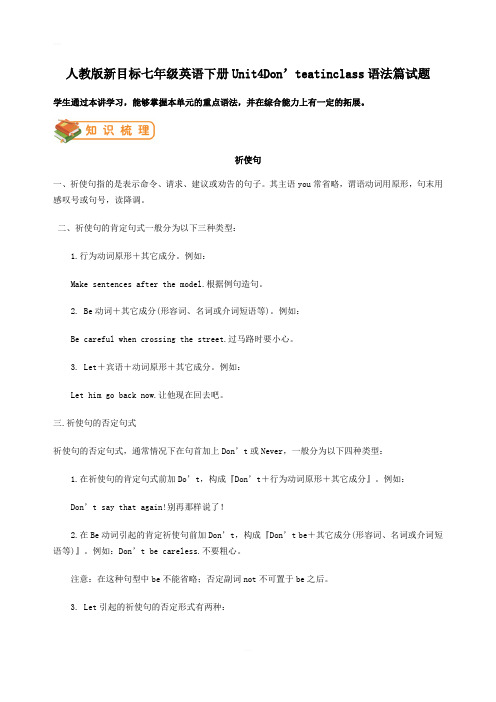
人教版新目标七年级英语下册Unit4Don’teatinclass语法篇试题学生通过本讲学习,能够掌握本单元的重点语法,并在综合能力上有一定的拓展。
祈使句一、祈使句指的是表示命令、请求、建议或劝告的句子。
其主语you常省略,谓语动词用原形,句末用感叹号或句号,读降调。
二、祈使句的肯定句式一般分为以下三种类型:1.行为动词原形+其它成分。
例如:Make sentences after the model.根据例句造句。
2. Be动词+其它成分(形容词、名词或介词短语等)。
例如:Be careful when crossing the street.过马路时要小心。
3. Let+宾语+动词原形+其它成分。
例如:Let him go back now.让他现在回去吧。
三.祈使句的否定句式祈使句的否定句式,通常情况下在句首加上Don’t或Never,一般分为以下四种类型:1.在祈使句的肯定句式前加Do’t,构成『Don’t+行为动词原形+其它成分』。
例如:Don’t say that again!别再那样说了!2.在Be动词引起的肯定祈使句前加Do n’t,构成『Don’t be+其它成分(形容词、名词或介词短语等)』。
例如:Don’t be careless.不要粗心。
注意:在这种句型中be不能省略;否定副词not不可置于be之后。
3. Let引起的祈使句的否定形式有两种:(1)Let开头的祈使句,如果后面跟第一、第三人称名词或代词的宾格,可在Let前加Don’t,也可在Let后宾格的名词或代词后面加not。
(2)如果以Let’s开头的祈使句,必须在Let’s后加not。
例如:Don’t let me go with her tom orrow. =Let me not go with her tomorrow.不要让我明天跟她一起去。
Let’s not tell her the truth whenever we meet her.无论什么时候我们碰到她,都不要告诉她真相。
七年级英语下册 Unit 4 Don’t eat in class短语、句型、作文汇总 (新版)人教新目标版
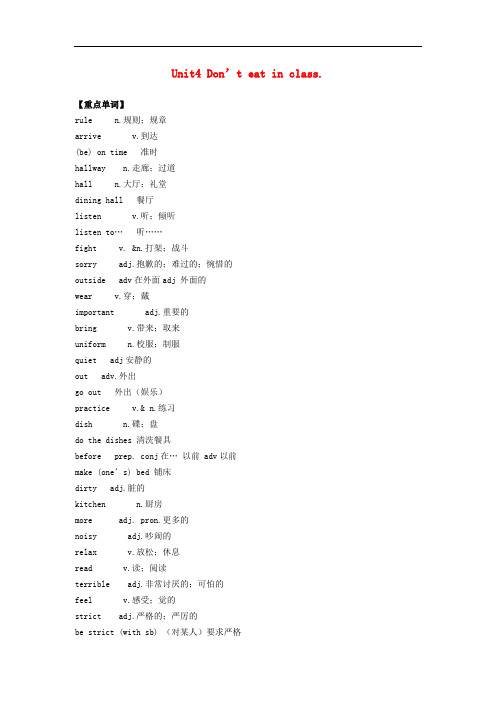
Unit4 Don’t eat in class.【重点单词】rule n.规则;规章arrive v.到达(be) on time 准时hallway n.走廊;过道hall n.大厅;礼堂dining hall 餐厅listen v.听;倾听listen to…听……fight v. &n.打架;战斗sorry adj.抱歉的;难过的;惋惜的outside adv在外面adj 外面的wear v.穿;戴important adj.重要的bring v.带来;取来uniform n.校服;制服quiet adj安静的out adv.外出go out 外出(娱乐)practice v.& n.练习dish n.碟;盘do the dishes 清洗餐具before prep. conj在…以前 adv以前make (one’s) bed 铺床dirty adj.脏的kitchen n.厨房more adj. pron.更多的noisy adj.吵闹的relax v.放松;休息read v.读;阅读terrible adj.非常讨厌的;可怕的feel v.感受;觉的strict adj.严格的;严厉的be strict (with sb) (对某人)要求严格remember v.记住;记起follow v.遵循;跟随follow the rules 遵守规则luck n.幸运;运气keep v.保持;保留hair n.头发;毛发learn v. 学习;学会【重点短语】1. Don’t eat in class 在课堂上2. arrive late for class 上课迟到3. be on time 准时4.in the hallways 在走廊里5.in the dining hall 在餐厅6. listen to music 听音乐7 fight with…与某人打架8.Don’t eat in class. 不要在课堂上吃东西。
人教版七级下英语Unit 4 Dont eat in class单元知识复习总结
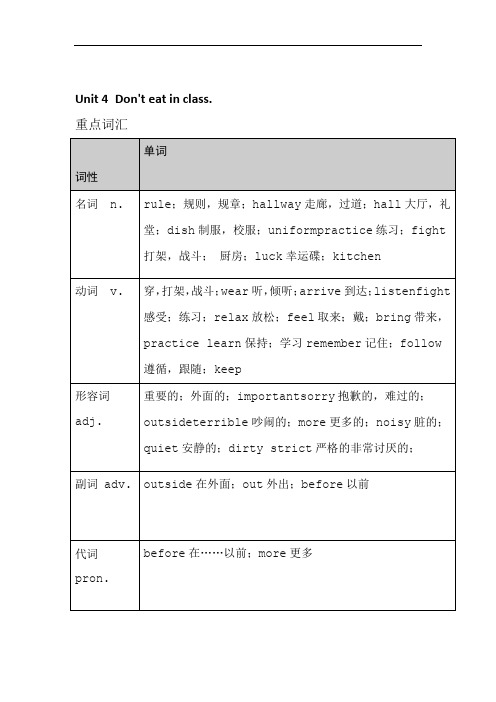
Unit 4Don't eat in class. 重点词汇重点短语Section A1.in class在课堂上2.arrive late for class=be late for class上课迟到3.on time准时4.in the hallways在走廊里5.in the dining hall在餐厅里6.listen to听7.at school在学校8.be late迟到9.music player音乐播放器10.bring...to school 把……带到学校来不得不做have to do.11.12.wear a school uniform穿校服13.be quiet安静Section B14.go out外出15.on school nights在上学期间的晚上16.practice the guitar练吉他17.do the dishes清洗餐具18.make breakfast做早饭19.make one's bed整理床铺20.leave sth.in...把……丢在……里21.read a book看书22.think about考虑23.make rules制订规则24.follow the rules遵守规则25.Good luck!祝好运!26.keep sth.+adj.使……保持……状态重点句型1.Don't eat in class.在课堂上不准吃东西。
2.Don't arrive late for class.You must be on time.不准上课迟到,务必守时。
3.Don't run in the hallways.不准在走廊内乱跑。
4.Don't eat in the classroom.You must in the dining hall.不准在教室里吃东西,务必在餐厅里吃东西。
5.Don't listen to music in class.不准在课堂上听音乐。
新版(人教版)七年级(下)英语Unit4课文详解

Unit 4 Don’t eat in class.Section A 2a—2d ( P20 )* 教师寄语:No rules, no standards. 没有规矩,不成方圆。
【学习目标】【学习重点】:1、学习掌握本节课的生词和短语;2、巩固祈使句的用法;3、学习情态动词can表示许可的肯定句、否定句、一般疑问句及肯定、否定回答。
4、提高学生的听说能力。
【体验学习】:I、预习交流1. 根据音标拼读单词并牢记;2. 自学课文,勾画出重点和疑惑。
II、翻译官1. eat outside ________________2. wear a hat ___________________3. a lot of ___________________4. be late for class_______________5. 不得不__________________6. 穿校服_____________________7. 保持安静________________【课堂导学】:I、新课呈现Step1 RevisionReview the school rules at P19.Step2 PresentationPresent key sentences in this period.This is a great school, but there are a lot of rules.Can we bring music players to school?And we always have to wear the school uniform.And we also have to be quiet in the library.Step3 ListeningListen and finish 2a and 2b. Check the answers.Step4 Pair workTalk about the rules in 2a.Step5 Role-playRole-play the conversation in 2d.II、合作交流Group work: 分析总结情态动词can的用法,并练习造句。
初中英语人教版七年级下册Unit 4 Don’t eat in class知识点整理

七年级英语下册Unit4知识点【Useful expressions】1.No talking 不许讲话 (No+动词ing,禁止......)2.the school rules 校规3.eat in class 上课吃东西4.run in the hallways 在过道上追逐打闹5.in the dining hall 在食堂6.fight with sb.=have a fight with sb.和某人打架7.go out on school nights 在上学期间的晚上外出8.on school days 在上学的日子9.arrive late for class= be late for class 上课迟到了10.wear a/the uniform 穿制服11.have to 不得不;必须12.eat outside 外面吃东西13.practice doing sth.练习做某事14.help mom make breakfast 帮助妈妈做早饭17.too many 太多(+可数复数)18.too much 太多(+不可数)19.so many 如此,这么多的(+可数名词复数)20.so much 如此,这么多的(+不可数名词)21.library rules 图书馆规则22.be strict with sb.in sth.在某方面对某人严格23.be quiet 安静24.be noisy 吵闹25.make the teacher unhappy 惹老师不高兴26.make a noise/make noises 制造噪音27.do the dishes 洗碗28.stay at home呆在家里29.on time 准时30.in time 及时31.learn to do sth.学习做某事32.learn from sb.向某人学习33.follow / keep /obey the rules 遵守规定34.break the rules 破坏规则35.make rules 制定规则36.keep one’s hair short 留短发37.think about 考虑38.make one’s bed 铺床39.in your home 在你家40.at home 在家41.Good luck to you! 祝你好运42.remember doing sth.记得做过某事43.remember to do sth 记得去做某事44.listen to sb.听某人说【Target sentences】1.--What are the rules?--Well, you must be on time for class.Don't fight with your classmates.2.We can’t listen to music in the classroom or hallways.3.--Can we bring music players to school?--Yes, we can./No, we can’t.4.And we always have to wear the school uniform.5.--Does he have to wear a uniform at school?--Yes, he does./No, he doesn't.6.--What do you have to do?--We have to be quiet in the library.7.Don't leave the dirty dishes in the kitchen.8.My dad says I can’t play basketball after school because I must do my homework.9.After dinner, I can’t relax,either.I must read a book before I can watch TV.10.I know how you feel.11.There are a lot of things you can do.12.Parents and schools are sometimes strict but remember, they make rules to help us.13.I think it’s best to follow the rules.14.I can’t go out on school nights.15.I have to do my homework after school.16.I must practice the guitar before dinner.【Language points】1.Don’t arrive late for class.(1)arrive v.到达;是不及物动词,若接地点名词,要加介词in或at。
人教版英语七年级下册-Unit-4-Don't-eat-in-class-语法解析

2021/2/4
1
6
疑问句: must 提前,回答时注意一二人称的互换。肯定用 must, 否定用needn’t. e.g. --Must I go home now?
-- Yes, you must. -- No, you needn’t.
B: And I must clean my room every Saturday. =?
A: Wow, you do have a lot of rules!
2021Dr. Know, There are too many rules! At 6:00 a.m. my mom says, “Get up now and make your bed!”
too many rules “太多的规定”, 其中too many 用来 修饰可数名词复数rules。 e.g. He has too many friends to meet.
修饰不可数名词时, 要用too much e.g. We have too much work to do.
much too 太……much 用来增强语气。后接形容 词或副词。
What can I do. Dr. Know? Molly Brown, New York
表“看”的单词?
either 也。用于否定句和疑问句中。肯定句中用too 表也。
watch,see,look r,read
2021/2/4
1
13
Dear Molly, I know how you feel. People always tell us, “ Don’t do this!” or “You can’t do that!” But think about it, Molly. There are a lot of things you can do. You can play basketball on weekends. You can watch TV after you read a book. Parents and schools are sometimes strict,
七年级英语下册《Unit4 Don’t eat in class Self check》课件 (新版)人教新目标版

Don’t talk loudly at night.
1. Fill in the blanks with the words in the box.
arrive late listen to be noisy follow the rules be strict
My name is Timmy the Mouse. I must get up early at 6:30 a.m. every morning. Then I have to go to the kitchen to get food for Grandpa. I never arrive late to the kitchen because I have to get there before the cat gets up. My grandpa always tells me I can’t be noisy . I listen to him because I don’t want the cat to get me! My grandpa is strict with me, but I think it’s best to follow the rules !
2. listen / teacher
Listen to the teacher. We must / have to listen to the teacher.
3. be noisy / library
We must not be / can’t be / Don’t be noisy in the library.
ExercisesⅠ. 词汇
1. Speak l______. I can’t hear you. oudly 2. Jack learns the piano in Children’s
人教新课标七年级下册Unit_4_Don't_eat_in_class 公开课电子课件

A Lesson Plan(The third plan for Unit 4)I . Aims and requirements:1. To make students learn by heart some words about agriculture2. To talk about rules in people's daily life3. To develop their abilities to think and speak in EnglishII. Contents:(Junior English, Book2, Unit4 Don’ t eat in class. )1. Words and expressions:Rule, arrive, outside, important, bring, take, quiet, practice, dish, before, after, kitchen, dirty, relax, strict, remember, forget, listen to, go out, make one’s bed, be strict with sb.2. Sentence patterns:What are the rules? What do you have to do?Don’t eat in class. Don’t run in the hallways.Don’t listen to music in the classroom.Can we wear a hat in class? Yes, we can. No, we can’t.III. Key and difficult points:1. To consolidate the usage of present simple tense2. To know the structure and usage of imperative sentences3. To let students express their ideas with their own wordsIV. ProceduresStage l. Warming -up and lead-in (about 2 minutes)To greet with students as usualAre there any rules in your family?Stage 2. Revision (about 5 minutes)To review some words we learnt in last classTo talk about the rules we learnt in last classStage 3.Pre-reading (about 6 minutes)When you are unhappy about something, who do you like to talk to? (Brainstorming)How does Molly feel about the rules?Why does parents and schools make rules?Stage 4. Reading (about 20minutes)l). Skimming* Read the whole passage within 5 minutes and divide it int0 4 parts* Give main idea ofeach part to us2). Scanning* What is the biggest problem ofChinese farmers?* What does GM mean?Stage 5. Post-reading (about 8 minutes)Stage 6. Homework (about l minute)Finish the practice 2 0n page 47 after class。
七年级英语下册Unit_Dont_eat_in_class_Section_A_新人教新目标

3a. Write the rules for the school library.
Library Rules 1. Don’t talk. 2. Don’t eat. 3. Don’t listen to music. 4. Don’t take photos.
3b. Use the words to make questions
A:_N__o_, _w_e__c_a_n_’t_.______
3c. Make up five cool rules for your dream
school. Share your rules with the class. Your classmates vote for the Coolest School!
Activity
√1. ___ listen to music in the classrooms or can
hallways
√2. ___ listen to music in the music room
can
√3. ___ listen to music outside
can
√4. ___ eat in the classrooms
Peter ___2__
3
4
Amy ___3__
Mike __4___Talk about the rules above.
A: What are the rules? B: Well, we can’t
arrive late for class.
2a. Listen. Check the activities Alan and Cindy talk about.
about the rules.
人教版七年级英语下册教案与习题:Unit 4 Don't eat in class

Unit 4 Don't eat in class.Section A (1a-2d)一、教学目标:1. 语言知识目标:1) 能掌握以下单词:rules, arrive, late, hall, dinning hall, listen, listen to, fight, sorry2) 能掌握以下句型:①Don't eat in class.②You must be on time.③Eat in the dining hall.2. 学会用英语表达一些标志的含义。
3. 熟练使用目标语言谈论对某些规章制度(校规、家规等)的看法3. 情感态度价值观目标:能用英语表达和制定一些简单的规则,理解没有规矩不成方圆;无论是在学校时还是在家庭中以及以后走上社会都应当遵守规则,按规则办事。
二、教学重难点1. 教学重点:1) 肯定祈使句是省略掉主语的原形动词开头;2) 否定祈使句则是在肯定祈使句前加上“don’t”。
3) 情态动词must及have to在用法上的区别。
2. 教学难点:掌握祈使句的用法,并能听懂、会说一些简单的祈使句。
三、教学过程Ⅰ. Warming-up and revision教师进教室后,使用祈使句请学生们完成一系列动作:Please stand up/ sit down. Close the door, please. Look at me and listen to me.Don’t open your books. Don’t talk. Let’s begin our class.学生听教师的指令完成各种动作,教师也可将指令写到黑板上,让学生从视觉上考察祈使句的特点。
Ⅱ. Presentation教师出示书上1a 的图片,向学生提问。
指着图上奔跑的男孩提问T:What’s the boy doing? S: He’s running.T: Where is he running? S: He’s running in the hallways.(板书,教读)T:Can you run in the hallways? S: No, I can’t.T: So please don’t run in the hallways.(板书,教读)(= You can’t run in the hallways.)学生跟读数遍,明白祈使句和“can”的表达含意。
2024年春七年级英语下册Unit4Don’teatinclass单元分析教案新版人教新目标版

Unit 4 Don't eat inclassSection A本单元以“规章制度”为话题,用祈使句、情态动词can, must, have to谈论班规、校规及家规。
Section A部分通过教室外墙壁张贴校规的形式呈现书面语的规章制度,然后通过听、说、读、写来学习规章制度的表达方法。
Section B部分通过Molly Brown的苦恼,介绍有关“家规”的内容,并引导学生正视“家规、校规”,使他们相识到:Teachers and parents make rules to help us. We have to follow them.1.Don't eat in the classroom.2.We can't arrive late for class.3.We must be on time.4.—Can we wear a hat in class?—Yes, we can./No, we can't.5.We have to clean the classroom.6.We have to follow the rules.1.祈使句的否定句用法 (详见P 语法聚焦)2.情态动词can表示“许可”的用法及have to的句型结构。
Some school rules in America1.If someone bumps into you, say excuse me, even if it was not your fault.别人碰撞到你,不管你有没有错都要说“对不起”。
2.Be positive and enjoy life.要乐观,要享受人生。
3.Live so that you will never have regrets.别让将来有缺憾。
4.No matter the circumstances, always be honest.不管环境如何,肯定要诚恳。
七年级英语下册-Unit-4-Don‘t-eat-in-class教案-(新版)人教新目标版

Unit 12 Don’t eat in class.I.教学设计分析本单元的中心话题是rules,主要语言功能是谈论并制定某些规章制度,如校规、班规和家规。
语言结构为祈使句。
利用情态动词can, must, have to 来谈论一些规章制度。
在Section A里通过活动与图片的配对,引出本部分中关于“学校的规章制度”及否定祈使句。
主要训练学生的听、说、演及其归纳总结的水平。
Section B主要通过一系列的句式进一步训练目标语言,并注意have to与 must, can与can’t的用法。
最后是要能使用所学的知识去制定一定的规则。
New languages:1.- Don’t run in the hallways. Don’t fight.2.-What are the rules? We must be on time for class.3.-Can we eat in the classroom?-No, we can’t, but we can eat in the dining hall.4.-Can we wear a hat in class? Yes, we can./ No, we can’t.5. - Does he have to wear a uniform at school?-Yes, he does. / No, he doesn’t.6. What do you have to do? We have to be quiet in the library.II. 教学学时分配Teaching periods:Period 1: Section A 1a -1cPeriod 2: Section A 2a -2cPeriod 3: Grammar Focus/ 3a -3cPeriod 4: Section B 1b -1fPeriod 5: Section B 2a-3c and self checkPeriod 6: Review Unit 1Unit 4 Don’t eat in class.Section A (1a-1c)1.Master the key words:rules, hallway, classroom, Mrs. fight, school rules.Master the sentences: 1). Don’t eat in class.2).You must be on time.3). Eat in the dining hall.2.Talk about the school rules.3.Listening and speaking skills and communicative competence.4. Encourage students to talk about the rules.5. To help Ss use the target language in natural speech.II. Key points1. Talk about the school rules and the target language.2. Learn to talk about the school rules.3. Imperatives Don’t...Difficult point:1. Talk about the school rules and the target language.2. Learn to talk about the school rules.III. Teaching aidsMultimedia/A tape recorder/A blackboardIV. Teaching proceduresStep1 Leading-inWarming-upT:What’s the woman doing? S: Sh e’s eating.T: Where is she eating? S: Sh e’s eating in class.T:Can you eat in class? S: No, we can’t.T: So please don’t eat in class.(= You can’t eat in class.)…Step 2 Presention1. T: Now, Look at the picture on your textbook. Each of the students is breaking one ofthese rules.Please finish 1a.1. Don’t arrive late for class. You must be on time.2. Don’t run in the hallways.3. Don’t eat in the classroom. You must eat in the dining hall.4. Don’t listen to music in class.5. Don’t fight.2. Listening1). T: Now let’s listen! What rules are these students breaking? Write the numbers after names?Peter ______ Amy ______ Mike ______2). Check the answers:3). Listen again and complete the conversation.Ms. Clark: Hey, Peter. You know the rules. Don’t _________________.Peter: Sorry, Ms. Clark.Mr. Smith: Amy, don’t _______________________.Amy: Oh, sorry, Mr. Smith.Mr. Smit h: Hey, Mike, don’t ______________ in class. Mike!Boy: He can’t hear you, Mr. Smith.Step3 ConsolidationPair workS.A is a new student. S.B is telling S.A about the school rules.Ask students to practice the conversation and make their own conversations.Ss work in pairs and practice saying the school rules.A: What are the rules?B: Well, we can’t arrive late for class. We must be on time.…Step 4 Summary1. Words: rules, arrive, late, hall, dinning hall, listen, listen to, fight, sorry Phrases: on time listen to… arrive/be late forSentences: 1. Don’t arrive late for class.You must be on time.2. Don’t run in the hallways.3. Don’t eat in the classroom. You must eat in the dining hall.4. Don’t listen to music in class.5. Don’t fight.2. Assign homework:1). Copy the new words (5E, 1C).2). Try to remember the words and expressions and use them freely.3). Write the rules in your school with“Don’t …. We can’t.... We must...”. V. Blackboard designUnit 4 Don’t eat in class.Section A1. Don’t arrive late for class.You must be on time.2. Don’t run in the hallways.3. Don’t eat in the classroom. You must eat in the d ining hall.4. Don’t listen to music in cla ss.5. Don’t fight.Teaching reflection:。
人教新目标 七年级英语下册同步测试 Unit 4 Don’t eat in class.(4课时 含答案)

Unit 4 Don’t eat in class.Section A₁ (1a—2b)I. 根据句意及图片提示填写单词1. English is an i _______ subject. We have to learn it well.2. My books are in my room. Can you b _______ them here?3. We have to w _______ our school uniforms every day.4. Don’t stand o _______. Come in, please!5. We must be q _______ in the library.6. I’m s ________ to be late for class again.II. 用适当的介词填空1. He sleeps late, so he arrives late _______ class.2. Everyone should listen ______ the teacher ______class.3. We can eat _______ the dining hall, but we can’t eat ______ the classroom or hallways.4. There are a lot ______ rulers in our school.5. Can I bring my music player _______ school?III.用所给单词的适当形式填空1. ______ (not be) late for the meeting, please.2 She _______ (have) to _______(wear) a hat.3. He has to ______ (arrive) there before ten o’clock.4. It’s my _______ (one) day at school.IV.单项选择( ) 1. —When do you arrive _______ school every day?—_______ eight o’clock.A. at; AtB. in: InC. in; AtD. at: In( ) 2. Annie’s bike is broken(坏的),so she ______ walk to school.A. have toB. has toC. need toD. must( ) 3. —_______ run in the hall ways, Mike.—S orry, I won’t.A. Don’tB. PleaseC. NoD. Not( ) 4. Nick is never late for work. He always gets to the office ______.A. on timeB. in timeC. at timesD. sometimes( ) 5. We can’t eat in the classroom _______ in the hallways.A. andB. orC. butD. so( ) 6. Many teachers don’t like Li Wei because he often _______ for class.A. be lateB. arrive lateC. are lateD. arrives lateIV. 根据汉语意思完成句子1. 不要在课堂上吃东西。
Unit4Don’teatinclass知识点总结人教版七年级英语下册

Unit 4 Don’t eat in class知识点总结短语归纳1in class 在课堂上 2arrive in/at 到达 3arrive late for 迟到 4be late for 迟到 5(be) on time 准时 6in the hallways 在走廊上 7listen to 听 (8)at shool 在学校 9bring...to... 带...到 (10)have to 必须,不得不 11fight with sb 和某人打架 12go out 外出 13on school nights 在学校的晚上 14practice doing sth 练习做某事 15do the dishes 清洗餐具 16make breakfast 做早饭 17make one's bed 整理床铺 18read a book 看书 19be strict with sb 对某人要求严格 20be strict in sth 对某事要求严格 21follow the rules 遵守规则 22make rules to do sth 制定规则 23good luck 好运 24too many 太多+可复 25too much 太多+不可 26 much too 太…用法集萃 典句必背 1. Don’t arrive late for class. 上课不要迟到。
2. Can we bring music players to school? 我们可以带音乐播放器到学校吗? 3. And we always have to wear the school uniform. 并且我们总是不得不穿校服。
4. There are too many rules! 有太多的规则! 5. Don’t leave the dirty dishes in the kitchen! 不要把脏盘子留在厨房里! 6. I have to keep my hair short. 我不得不留短发。
人教版新目标英语七年级下册:Unit 4 《Don't eat in class》

Unit4 Don’t eat in class!附参考答案一.单项选择.1.____ late. It’s your first day to work.A. Don’t to beB. Don’t beC. Don’tD. No 2.-______sing! -All right.A. LetB. Let’sC. We let3.When will the train ______?A. arriveB. arrive atC. reachD. arrive in4.I ______ but I _______ nothing.A. listened ; heardB. listened; hearC. heard; heardD. heard; listened5.The girl ______ the red dress is Jill Green.A. withB. wearC. put onD. in6.-Do you have an eraser?-______. I have _______ eraser.A. No; notB. Not; noC. No; noD. Not; not7. Mary usually _____ her dog at weekend.A. walkB. takesC. go withD. walks8. Don’t ______ bed by 9 o’clock.A. goB. inC. be inD. go in9. We can’t go out _______ school nights.A. atB. inC. onD. by10. He can’t meet his friends tonight because he _______ do homework.A. has toB. needC. have toD. don’t have to11. It’s very warm. You ______ to wear the coat.A. mustB. d on’t have toC. have toD. mustn’t12. Don’t go into the classroom _______ the teacher.A. withB. togetherC. withoutD. with not13. He can’t _______, but he often _______ to the beach and play.A. swimming, goB. swim, goesC. swims, goesD.swim, go14. Does she always wear _______?A. uniformB. sneakerC. a uniformD. a sneaker15. There are ________ rules in our class.A. many tooB. too muchC. much tooD. too many16. Tom never ________ fun at home.A. have muchB. has anyC. have anyD. has many二.句型转换。
七年级英语下册 Unit 4 Don’t eat in class Section A(2a-2d)教案 (新版)人教新目标版.doc

Unit 4 Don’t eat in class教学目标知识与技能:New words and expressions: out, wear, important ,bring, have to, uniform, q uiet. New languages: Can we listen to music?Yes,we can. We can...No,we can’t. We can’t...过程与方法:通过Pairwork问答式的口语交际活动和小组活动来谈论学校的规则。
情感态度价值观:让学生明确学校的一些规则,做一名文明守纪的中学生。
教学重难点Learn to talk about rules:What are the rules in your school / class? Learn to talk about rules:What are the rules in your schoo l / class?教学方法以听说为主,通过讨论一些课上的制度创设情境,层层推进。
学习方法运用合作交流、互相探究等学习方法。
教学准备教师:录音机、磁带、课本、收集一些学校规则。
学生:预习生词,列举自己的家规。
教学过程设计意图Step 1.Lead inTeacher:Our school is very big and beautiful,and there are a lot of rules helping us to study better. Can you tell me the rules in the school?Step 2完成教材2a—2c的任务1.听录音,将Cindy和Alan所谈论的活动选出来完成2a,展示答案,教师点评。
2.听录音并根据要求完成题目2b,小组内核对答案,教师展示答案。
3.再听一遍录音,跟读并体会can,can't的用法。
4.两人一组,根据2a中的信息,仿照2c的形式来练习对话,并邀请几组学生表演对话。
2020七年级英语下册 Unit 4 Don’t eat in class短语、语法知识点汇总 (新版)人教新目标版
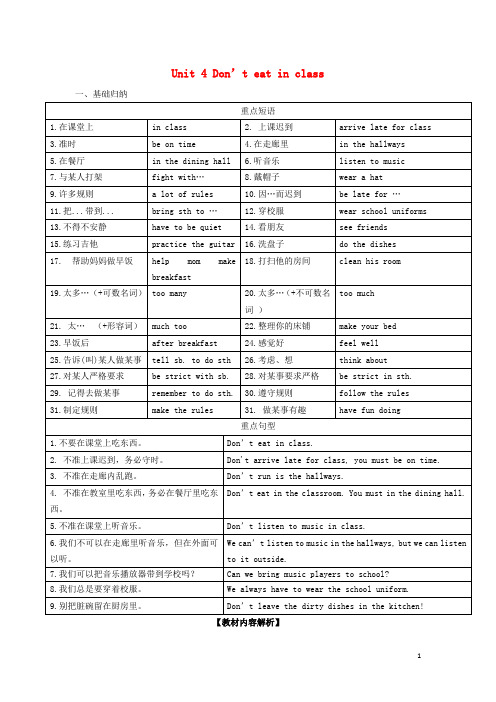
Unit 4 Don’t eat in class 一、基础归纳【教材内容解析】Section A1.Don’t arrive late for class. (P. 19)arrive作不及物动词,表示“到达”,接宾语时,需要加上介词in或者at。
When did you arrive?We are arriving at the station at two o’clock.【拓展】reach表示“到达”时,是及物动词,后面直接接表示地点的名词作宾语。
另外两个表示“到达”的动词(get和arrive)都是不及物动词,get to+地点;arrive in/at+地点。
After a long way, they reached/got to/arrived at the top of the mountain finally.2.You must be on time. (P. 19)on time用作固定短语,表示“准时、按时”,in time表示“及时”。
The train arrives on time.The ambulance(救护车) arrives in time.3.Don’t listen to music in class. (P. 19)listen用作不及物动词,表示听的动作,后接宾语时,需要加上介词to,hear强调听的结果,表示“听到”。
This girl likes to listen to music.Can you hear anything?4.Don’t fight. (P. 19)fight此处用作动词,意为“打架”,fight with sb.意为“与某人打架”。
Why do you sometimes fight with others?5.listen to music outside (P. 20)outside表示“在外边”,反义词为inside“在……里面”。
新版新目标英语七年级下unit4--Don't-eat-in-classPPT课件
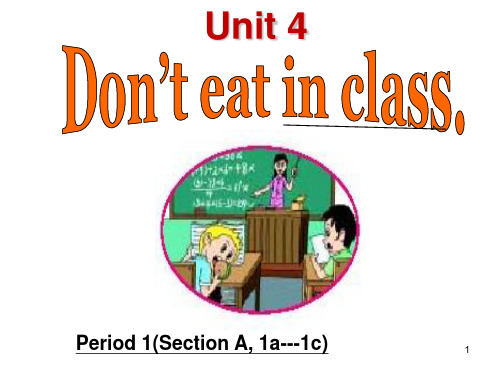
Don’t listen to music in class.
.
11
Can you fight in school?No, we can’t.
Don’t fight .
.
12
Words &Expressions on Page 19
• rule n. 规则;规章
• arrive v. 到达
permission. • Get the Ss to know what they can do and what they
can’t do. • Have the Ss learn how to expore sth by group work. • Get the Ss to know wesern culture about schools.
3
4
2. Don’t run in the hallways.
Don’t run in the hallways.
3. Don’t eat in the classroom. You must eat in the dining hall.
4. Don’t listen to music in class.
• ( be )on time 准时
• hall n. 大厅;礼堂
• hallway n. 走廊
• dining hall 餐厅
• listen v. 听;倾听
• listen to... 听.......
• fight v. & n. 打架;战斗
• sorry adj. 抱歉的;难过的;惋惜的
13
Don’t+动词原形+其他.(,please.)
- 1、下载文档前请自行甄别文档内容的完整性,平台不提供额外的编辑、内容补充、找答案等附加服务。
- 2、"仅部分预览"的文档,不可在线预览部分如存在完整性等问题,可反馈申请退款(可完整预览的文档不适用该条件!)。
- 3、如文档侵犯您的权益,请联系客服反馈,我们会尽快为您处理(人工客服工作时间:9:00-18:30)。
Don’t eat in classSection A 第1课时(1a~1c)自主学习方案1.自学生词,并记住拼读及拼写。
2.预习课本找出重点短语及句子。
(见学案自学导练内容)3.读记后完成自学导练内容。
课堂导学方案Step 1情景导入Show the students the picture of fighting.T:Look at the two boys. What are they doing?Ss:(Help Ss) :They are fighting.T :Can we fight?Ss:No,we can't.T :What should we say to the boys?Ss:We should say to them: Don't fight.环节说明:通过师生对话引出新知识—祈使句。
Step 2完成教材1a_1c的任务1.学习la中的学校规定,大声朗读这些规定,然后将这些规定的序号填在相对应的人物旁边。
(3分钟)2.认真听录音,找出Peter,Amy和Mike违反了哪些规定,在lb中的横线上写出la 中的数字,师生共同核对答案。
(2分钟)3.再听一遍录音,同时跟读。
(2分钟)4.练习lc中的对话。
然后编写新对话,小组内进行对话练习,并进行组与组之间的比赛,教师点评。
(5分钟)5.小结训练。
(3分钟)把下列祈使句改成否定形式。
(1)Eat in the hall. Don't eat in the hall.(2)Talk loudly. Don't talk loudly.环节说明:听说结合,第一时间向学生传达语言目标,通过结对对话练习和小结训练,学生可以熟练掌握祈使句。
Step3问题探究1.arrive的用法用 arrive,arrive in/at 填空。
(1)When do you arrive in Shanghai every week?(2)When I arrive at Yucai Middle School in Shanghai,it is 7:50.(3)After I arrive here,I begin my class.【注意】arrive“到达”,arrive是一个不及物动词,不能直接跟表示地点的名词。
如果要跟名词,就必须加介词in或at。
在“大地方”前加in;在“小地方”前加at。
如果arrive 后是地点副词,就不用介词。
2.我们学过的“到达”的另一种表达法是:get to。
下周上学不要迟到。
Don't be late for school next week.(1)打开门 open the door(2)不要在教室里听音乐。
Don't listen to music in the classroom.【注意】祈使句的开头是动词原形。
祈使句的否定形式多以don't开头,再加上动词原形。
4.We must go to school A every day.A. on timeB. in timeC. for timeD. at time【注意】on time“准时”;in time “及时”。
Step 4 家庭作业完成课后提升作业(学案P. 22)。
教学反思本课时通过图片展示,师生对话形式引出新知识,结合结对对话练习、小组比赛等活动,强化语言目标,提高课堂教学效率。
Don’t eat in classSection A 第2课时(2a~3c)自主学习方案1.自学生词,并记住拼读及拼写。
2.预习课本找出重点短语及句子。
(见学案自学导练内容)3.读记后完成自学导练内容。
课堂导学方案Step 1情景导入Teacher:Our school is very big and beautiful,and there are a lot of rules helping us to study better. Can you tell me the rules in the school?环节说明:通过这个环节既复习了上节课学习的内容,又练习了学生的口语。
Step 2完成教材2a—2c的任务1.听录音,将Cindy和Alan所谈论的活动选出来完成2a,展示答案,教师点评。
(3分钟)2.听录音并根据要求完成题目2b,小组内核对答案,教师展示答案。
(3分钟)3.再听一遍录音,跟读并体会can,can't的用法。
(2分钟)4.两人一组,根据2a中的信息,仿照2c的形式来练习对话,并邀请几组学生表演对话。
(2分钟)5.小结训练。
(2分钟)用can和can't填空。
(1)Mr. Green can't smoke (吸烟)here,because there ’ s a sign on the wall.It says “No smoking”.(2)It,s very hot outside. You can wear a hat.Step 3完成教材2d的任务1.学生认真自读对话,根据对话内容完成下列句子。
(5分钟)(1)John,s new school has a lot of rules .(2)It’s important to be on time .(3)John can ’ t bring music players to school .(4)John always wears the school uniform to school and is quiet in the library.2.大声朗读2d对话,读熟后与同伴结对练习,分角色表演对话。
(分钟)环节说明:将对话转化成填空题,这样能对所学的重要句型起到复习巩固的作用。
S te p 4 完成 Gramm e r Fo c us1.学生归纳。
2.师生参考学案p. 26的单元语法透析,并完成练习。
S te p 5 完成教材3a—3c的任务1.认真观察图片,用所学的祈使句句型为学校图书馆写一些规定,写完后小组内交流,教师抽查点评。
(2分钟)2.利用所给的单词或短语来组成关于学校规定的句子,然后根据学校的实际情况来回答。
请学生在黑板上展示答案。
(分钟)3.写五条理想学校的校规,然后和其他同学分享,选出最受欢迎的校规。
(3分钟)4.利用所选出的校规来写一篇小短文。
(5分钟)S te p 6问题探究must和have to的用法(1)你不得不穿校服吗?Do you have to wear the school uniform?(2)—我现在必须要走吗?—不,你不必。
—Must I go now?—No,you needn't .【注意】have/has to + 认原形:强调由客观原因造成的不得不去做……;must +v.原形:强调由主观要做……,must没有时态、人称和数的变化,must的否定回答为needn't。
S te p 7 家庭作业完成课后提升作业(学案p. 23)教学反思本课时以师生问答形式自然地引出新知识,通过结对练习、角色扮演等形式活跃课堂气氛,并且将听、说、读、写相结合,提高学生的听力、口语、写作能力。
Don’t eat in classSection B 第3课时(1a~1d)自主学习方案1.自学生词,并记住拼读及拼写。
2.预习课本找出重点短语及句子。
(见学案自学导练内容)3.读记后完成自学导练内容。
课堂导学方案Step 1情景导入(2分钟)Show students a photo of Dave and tell the students:Dave has some school rules to follow at school. And at home,he also has rules. What are the rules at Dave’s home. Do you want to know? Let' learn together and you will find the answer.环节说明:通过设置悬念,引起学生的学习兴趣,导入本课的学习。
Step 2完成教材1a_1d的任务先让学生仔细看la中的图片,教师用句型“What is he/she doing?”提问。
然后指出这些制度,教师领读。
最后将lb中的短语和la中的图片匹配,并核对答案。
(5分钟)听录音,标出Dave不能做的事情和他必须要做的事情,集体核对答案,完成lb。
(2分钟)记忆lc中的短语,然后听录音,从lc中选出 Dave遵守lb中这些规定的时间。
(5分钟)两人一组仿照ld的对话形式,结合实际谈论自己的家规。
最后请学生做简短的报告。
(5分钟)参考案例:5.小结训练。
(3分钟)(1)—Can you watch TV C dinner?—No,but I can do it after dinner.A. forB. afterC. beforeD. on(2)— Why are you walking so fast?— Because I C get home to do my work.A. haveB. go toC. have toD. has to(3)—Can you cook dinner?— B . It’s easy.A. No,I can'tB. Yes,I canC. No,I canD. Yes,I need环节说明:本环节的学习使学生熟练地掌握情态动词can,can't和have to的用法,并且为谈论自己的家规奠定了基础。
Step3 问题探究1.practice 的用法练习吉他 practice the guitar练习弹吉他 practice playing the guitar【注意】practice意为“练习,实践”。
它的后面可以跟名词、代词或动词v-ing形式。
2.在上学期间的晚上 on school nights【注意】night前若有其他词汇修饰,指具体的某个晚上,应用介词on。
3.help 的用法(1)帮助他们 help them(2)帮助他们学英语 help them with English(3)帮助他们洗餐具 help them (to) do the dishes【注意】help sb. with sth.在……上帮助某人,help sb. (to) do sth.帮助某人干……Step 4 家庭作业完成课后提升作业(学案p. 24)。
教学反思本课时以悬念导入法开场,巧妙设置悬念,使学生投入到积极地揭示“谜底”中来,开展结合实际的话题讨论,既吸引学生的兴趣,又锻炼口语表达能力。
